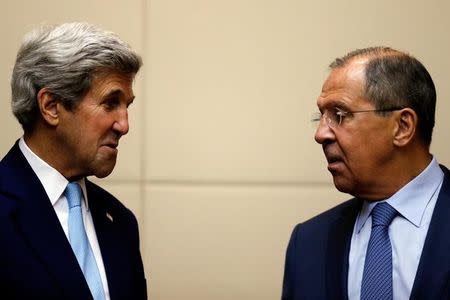U.S., Russia fail to reach breakthrough deal on cooperation in Syria
By Lesley Wroughton and Stephanie Nebehay GENEVA (Reuters) - The United States and Russia failed on Friday to reach a breakthrough deal on military cooperation and a nationwide cessation of hostilities in Syria but said they had a few "narrow" issues to resolve before an agreement could be announced. U.S. Secretary of State John Kerry and Russian Foreign Minister Sergei Lavrov, addressing a joint news conference after more than nine hours of off-and-on talks in Geneva, said teams from both sides would try to hash out the final details in coming days in the Swiss city. Kerry said the sides had "achieved clarity on the path forward" and that the vast majority of steps toward renewing a February ceasefire and humanitarian plan were completed during the talks. "We don't want to have a deal for the sake of the deal," Kerry said. "We want to have something done that is effective and that works for the people of Syria, that makes the region more stable and secure, and that brings us to the table here in Geneva to find a political solution." The talks have been complicated in part by a significant offensive in the southern part of the divided city of Aleppo led by some U.S.-backed opposition groups that are intermingled with the group formerly known as al-Nusra, an al-Qaeda affiliate in Syria that is also involved in the fight against President Bashar al-Assad. The main focus of the technical talks has been over how to separate the opposition groups from the jihadis. Lavrov said "once and for all" the groups that were part of a cessation of hostilities agreement had to be delineated. "We have completed the vast majority of those technical discussions which were primarily focused on making this cessation real and improving humanitarian assistance and thereby getting the parties to the table so we can have a serious negotiation about how to end this war," Kerry said. Both Kerry and Lavrov said there were few issues that needed to be fleshed out before an agreement could be reached and warned that it could collapse unless a "period of calm" was established before the deal can be implemented. "We have a few, narrow issues to resolve. And in the next days our experts will be meeting here in Geneva to conclude the few remaining technical issues and to move forward to take steps to build the confidence to overcome the deep distrust that does exist on all sides," Kerry said. Kerry believes the plan is the best chance to limit fighting that is driving thousands of Syrians into exile in Europe and preventing humanitarian aid from reaching tens of thousands more. "That cessation needs to be overhauled if it is going to achieve the reduction in violence that the people of Syria want and deserve and open the window of opportunity for us to be able to get to the table here in Geneva and have a real negotiation about the future, a political solution to the challenge of Syria," he said. The talks came as opposition groups effectively surrendered the Damascus suburb of Daraya to the government after a grueling four-year siege. Kerry said the Syrian regime "forced the surrender" of Daraya in contravention of the February cessation of hostilities agreement, but Lavrov said the local accord was an "example" that should be "replicated". The Russian foreign minister said that another besieged area was "interested in such an operation with mediation of the Russian Federation". Residents and insurgents in Daraya began to leave the besieged area where civilians have been trapped since 2012 and the UN and the International Committee of the Red Cross expressed concern for their safety. (Additional reporting by Lisa Barrington in Beirut and Firas Makdesi and Kinda Makieh in Damascus; Editing by Richard Balmforth and James Dalgleish)



